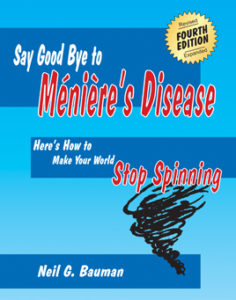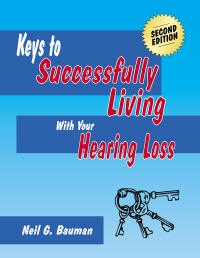by Neil Bauman, Ph.D.
A man explained,
I cannot hear most bird song, crickets, frogs, small wind chimes, and many voices if there is background noise, and most especially—the higher the frequency of the voice the less intelligible it is. The ENT doctor at the hospital explained to me my hearing loss and showed me the frequency curve and associated loss, which appeared dramatic (no big surprise since I had done the “Internet” hearing test with a quality pair of headphones), and then went on to say I could understand speech okay. I countered with the fact that my visit was prompted by NOT being able to understand speech okay.
She seemed to be in more of a hurry to get to lunch and finished with “You are eligible for hearing aids” and gave me a medical form stating that fact. Now that I have my hard earned medical certificate (do I really need one?) for hearing aids I am starting to navigate the process of collecting information so I can make a well informed choice before plunking down my hard earned cash for a pair of hearing aids. I have perused a fair number of Internet sites in search of information, but I want some advice from a real person rather than from anonymous Internet posts, or hearing aid manufacturer’s or dealer’s hype.
I have a few questions, but welcome any advice about purchasing or wearing hearing aids.
1. Did you buy hearing aids based on low price and then wish you had gone for something more advanced, not necessarily more bells and whistles?
2. Behind the ear or in the ear?
3. Can you test drive hearing aids?
4. What if after a few days or weeks you are totally unhappy with your purchase, are you just “out of luck”?
5. The biggest complaint about hearing aids (besides battery issues/costs)?
6. Buying hearing aids- what are the “buyer beware” experiences I should be aware of?
7. Favorite hearing aid dealer?
ENTs are not experts in hearing loss from a practical standpoint. They typically know medical “stuff”, but not the practical stuff they should know. Audiologists are much better at that—but even there, they are often ignorant of stuff on which they should be expert.
If you have a significant high-frequency hearing loss (which you seem to have), then you do have trouble understanding speech—particularly when there is background noise present.
A good measure of how well you understand speech is to look at your word recognition (discrimination) scores on your audiogram. If they are 100%, then your doctor is right—but I suspect your scores are down maybe to 70% or so. If this is the case, this would mean that without other clues, you hear but do not understand 3 out of every 10 words you hear.
It is wise to have your ears checked out by a medical doctor (ENT or otologist) to be sure there are no complicating medical reasons for your hearing loss that doctors can do something about. This is the basis for needing that certificate from your doctor, but you do not need one in order to get hearing aids. If you choose to, you can sign a waiver stating that you do not want to go to a medical doctor regarding your hearing and then buy hearing aids from someone licensed to sell them.
Note: hearing aid dealers and audiologists are not allowed to dispense hearing aids to you unless you have a doctor’s certificate or you sign the waiver (and before you do that, they have to explain to you why you really should go to a doctor first).
You’re a smart guy—”collecting information so you can make a well informed choice before plunking down your hard earned cash for a pair of hearing aids.” Too many people just take the recommendation of their hearing aid dispenser and pay big bucks for what often turns out to be a poor choice in hearing aids.
Now, let’s look at each of your specific questions in turn.
1. Did you buy hearing aids based on low price and then wish you had gone for something more advanced, not necessarily more bells and whistles?
How could a person know the answer to that—unless they had tried them all? The truth is, few people are totally happy with their hearing aids in all situations. This is just another way of saying that hearing aids are far from perfect and do not measure up to normal hearing. Therefore, you need to decide exactly what you want to hear, and then find the best solution for hearing in that situation.
For example, if you have trouble hearing your TV, you might find hearing aids work well, or you might find that assistive devices such as a home loop system and loop receiver let you understand more than your fancy hearing aids (and at a fraction of the cost).
There are two basic enemies of hearing aids. One is noise, and the other is distance. In noisy situations or when you are at a distance from the speaker, you may find that assistive devices are much more effective in helping you understand than your hearing aids are. Note, combining assistive devices with your hearing aids can turn them into awesome devices. In order to do that effectively, you need a “coupling device” and the cheapest and most universal coupling device is the t-coil.
2. Behind-the-ear (BTE) or In-the-ear (ITE)?
There is no right or wrong answer here. Both have advantages and disadvantages. Personally, I wear BTE aids. BTE aids tend to be cheaper, last longer, need fewer repairs and have room for more “goodies” than ITE aids. Furthermore, because they have external molds, if the mold breaks, your dispenser can give you a loaner hearing aid, and you just switch your ear mold to the other aid. With ITE, In-the-canal (ITC), Completely-in-the-canal (CIC), etc. aids, the shell of the hearing aid IS the ear mold so you have to send the whole thing away to be fixed and that leaves you with nothing in the meantime.
Also don’t decide based on size. BTE aids are more visible than CIC aids, but what is the purpose of getting hearing aids—to hear better, or to be invisible? Thus, always choose the hearing aid that helps you hear the best.
3. Can you test drive hearing aids?
Sort of. Typically, you pay up front for your hearing aids—BUT you generally have 30 days to try them out and if you return them within 30 days, you can get your money back.
Note that typically, you do not get all your money back. By law your hearing aid dealer/audiologist can retain the lesser of 10% of the cost of the aids or $150.00 per aid. A few don’t even charge this so it pays to shop around.
4. What if after a few days or weeks you are totally unhappy with your purchase, are you just “out of luck”?
You need to watch your time frame. After the trial period (typically 30 days as set by law in many states, but it could be more or less depending where you live), you are out of luck. Therefore, if you are still in doubt on day 29—take them back and get your money back.
5. The biggest complaint about hearing aids (besides battery issues/costs)?
Hearing in noise is the one almost universal complaint hearing aid wearers have. Don’t let anyone tell you that hearing aids are the whole answer to hearing well under all conditions. This is just not true. Hearing aids are only a part of the solution. Assistive devices are another important part.
Since distance and noise are two enemies of hearing aids, you want to be sure your hearing aids have a means of coupling with assistive devices to help you hear better in such situations. There are several ways a hearing aid can couple with external devices. Some are proprietary (and thus expensive) and others are inexpensive and almost universal.
Make sure that any hearing aids you consider have telecoils (t-coils) in them. Any dispensers that tell you that t-coils are now obsolete or unnecessary don’t know what they are talking about. Run from them. T-coils are so useful/important that I won’t purchase hearing aids without them. I’ve had t-coils in my hearing aids for at least 45 years.
Also, don’t be fooled by slick marketing hype that says a company’s hearing aids are “telephone compatible” because they have a “telephone mode” in them. This is not a t-coil, but just one memory optimized for phone use—not the same thing at all, so be careful.
Some hearing aids have FM receivers built in. These are proprietary systems and cost the world (and you need the corresponding FM transmitters). In my opinion, it is much better to have t-coils in your hearing aids that will couple to any external FM system. Get your own FM system that will work with all hearing aids with t-coils. That way when you change brands of hearing aids in the future, your assistive devices won’t suddenly become obsolete.
Some hearing aids have remotes that you typically wear around your neck. This can be nice. They typically have a direct audio input (DAI) jack on them so you can plug any audio source directly into your hearing aids. That way, for example, you could listen to your iPod via your hearing aids without any other noise interfering with your enjoyment of your music.
A remote also typically will have bluetooth built in so you can listen to any bluetooth device including your cell phone. This is another nice feature. (Just don’t let anyone tell you that because your hearing aids have bluetooth, you don’t need t- coils. That is a bunch of baloney. They are two completely different “animals” and have different uses.)
6. What are the “buyer beware” experiences I should be aware of when buying new hearing aids?
My number one caution is don’t buy from a source that only sells one brand. Such sources tend to be high-priced and tend to use high-pressure sales techniques. You should try 2 or 3 brands to see which one sounds best to you. Each of us is different and what sounds good to me may sound bad to you. So opt for a few choices and then make up your own mind. A dealer that sells 3 or 4 different brands is a good choice.
In addition, decide what features you want in your hearing aids. Over the years I’ve worn a number of different makes of hearing aids. Some were great in one area and less so in others. (I wish I could have chosen the good parts of each aid and put them all together to make one awesome aid!) So pick the aid that meets your primary needs and most of your secondary desires.
7. Favorite hearing aid dealer?
My best advice here is to ask around. Find those hard of hearing people who are really happy with both their hearing aids and their dealers. You want a dealer that is knowledgeable about fitting hearing aids—not someone that just uses the manufacturer’s algorithm in fitting them. The manufacturer’s fitting algorithm is a good place to start, but the fitter you choose needs to have the knack of knowing how to tweak hearing aids to specifically fit your unique hearing needs. You also want someone that is willing to spend the time to fit you properly—and tweak them again (and again) until you are happy.
Also, beware of those dealers that start by trying to sell you their most expensive top of the line hearing aids first. (When they do this, they obviously are more interested in parting you from your money than they are in helping you hear the best you can.) There are actually some hearing aid dispensers and audiologists that start at the bottom and sell you what you need, and if the cheapest aid does that—that’s all you pay. If not, they go to the next more expensive line, etc. They are few and far between, but they are “gems” when you do find them.
So there are some tips on purchasing hearing aids that will help you avoid many of the major pitfalls.



It’s a sincere shame to hear that hearing aids – a medical device – are so prone to unethical providers. It feels like buying a used car…